These days my movie viewing is restricted to what limited cable offers me. The selection is not great and that may be why the recent writings have been about relatively recent romantic comedies. It’s either those or movies about sweaty guys and things blowing up. So today, another rom-com … Continue reading
How one romantic comedy could have been fixed
It doesn’t seem right to call this a romantic comedy but that is how most would refer to it. Probably the most frustrating thing about it is that it could have been a good romantic comedy. It had the ingredients. It had the actors. So what went wrong? Continue reading
Charming swindlers
There are certain movies I can make a reference to and people immediately know the film and usually recall it with a smile — if not outright laughter. Dirty Rotten Scoundrels is one of those movies. It didn’t change the world of movie making when it came out and didn’t win any awards. It simply did what most movies hope to do: get seen, be appreciated and remembered.
Subversive Preston Sturges and Morgan’s Creek
Eddie Bracken just looks funny. It’s not in a physically distorted way; it has something to do with the innocent, cherubic quality of his face that makes you smile. And when he starts moving? You start to laugh.
Easy Living (1937): Everybody fall down
When a an expensive fur coat falls on her head, Mary Smith’s life of scraping together enough for food and rent turns upside down. She suddenly finds herself in a world of wealth, as she’s mistakenly perceived of as the mistress of Wall Street banker and tycoon, J.B. Ball.
Easy living was never so hard — or muddled and funny.
Ernst Lubitsch and his lustfully troubled Paradise
Without really planning too, I’ve found myself watching the movies of Ernst Lubitsch. A few nights ago it was The Shop Around the Corner. Last night it was Trouble in Paradise. I had seen both before, at least once each. What I find interesting is that the more I see them, the more I like them. The first time around you miss how well constructed they are because they evolve so seamlessly. So I definitely recommend seeing them at least twice.
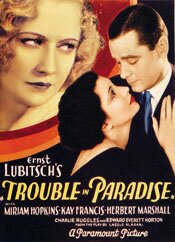 Trouble in Paradise (1932)
Trouble in Paradise (1932)
One of the finest romantic comedies ever made, and one that in many ways created a template and set standards for later romantic comedies (while also looking ahead to the screwball comedies to come), is Ernst Lubitsch’s Trouble in Paradise, made in 1932.
With a single film, American cinema suddenly grew up. In many ways, it’s the most adult film Hollywood has ever made. (Not long after, production codes were put in place and much of what is in Trouble in Paradise would not have been allowed.)
Prior to Lubitsch’s first nonmusical American film, the sophisticated manner and style of this movie hadn’t been seen, not on this side of the Atlantic. Nor had this degree of elevated wit or sexual play.
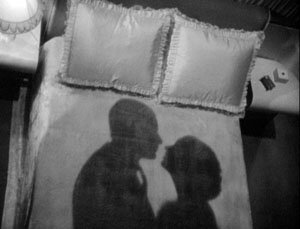 Much is made of the “Lubitsch touch,” and there certainly is such a thing. While a bit hard to define precisely, it has a great deal to do with a European sensibility, one not informed by a Puritan cultural background. It has to do with wit and sophistication and adult romance.
Much is made of the “Lubitsch touch,” and there certainly is such a thing. While a bit hard to define precisely, it has a great deal to do with a European sensibility, one not informed by a Puritan cultural background. It has to do with wit and sophistication and adult romance.
Here, adult means playful, well-mannered and tinged by a degree of melancholy. Trouble in Paradise is a perfect example of this.
The movie is about two charming thieves, their love for one another, as well as their enjoyment of their craft. It’s about the playfulness between them, and the woman whom they choose as their mark.
Herbert Marshall is the thief Gaston Monescu. He charms his way into the life of Mariette Colet (Kay Francis) in order to steal her money. His love, the pickpocket Lily (Miriam Hopkins), is his accomplice.
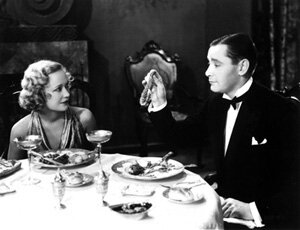 But this is what Hitchcock would call the McGuffin. The movie is really about the triangle that develops as Gaston becomes romantically enchanted by Mariette just as she falls in love with him. All the while, Lily is still there and still loves Gaston, just as he still loves her.
But this is what Hitchcock would call the McGuffin. The movie is really about the triangle that develops as Gaston becomes romantically enchanted by Mariette just as she falls in love with him. All the while, Lily is still there and still loves Gaston, just as he still loves her.
Lubitsch’s direction is nothing less than wonderful here. One of the qualities that characterize his films, especially in Trouble in Paradise, is his refusal to be obvious about anything. He tells his story through indirection and implication, rarely being overt.
This is particularly true with the way he implies sexuality and its encounters without ever stating, much less showing, anything. It is part of the film’s playful wit and charm and adult quality. Equally adult is the absence of any salacious sense. There is no sense of “nudge-nudge, wink-wink” here.
Yet, essentially, the film is about lust, Gaston’s and Mariette’s.
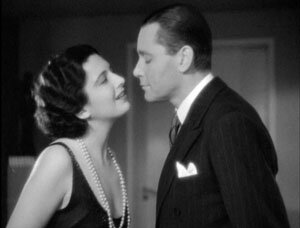 As Peter Bogdanovich mentions in his introduction to the Criterion DVD of the film, it’s a wonder this was ever made in Hollywood, particularly when we see where we are today.
As Peter Bogdanovich mentions in his introduction to the Criterion DVD of the film, it’s a wonder this was ever made in Hollywood, particularly when we see where we are today.
While the troubled triangle of Gaston, Mariette and Lily plays out, the movie also gives us the ineffectual efforts of the Major (Charlie Ruggles) and Francois (Edward Everett Horton), two of Mariette’s luckless suitors. Their ineptness and pretensions provide a nice comedic counterpoint to the sophistication of Gaston.
Much of what Lubitsch does isn’t noticed on first viewing the movie. It is too seamless and fluid. The plot unfolds too effortlessly. It’s only on seeing a second or third or fourth time you see the small details he attends to and just how cleverly the movie is constructed.
In cinema terms, Ernst Lubitsch was a magician. Much of what he does is a kind of sleight of hand — verbal and visual. His movies, like Trouble in Paradise, are mature, charming and absolutely wonderful.
See:
Comedy gem – Planes, Trains and Automobiles
I’ve been prattling about comfort movies recently but so far have suggested only one example from the list I’m compiling. But tomorrow, Thursday, is Thanksgiving in the United States — which may go back as far as 1565, finding its start in Florida. I say “may.” I’m not saying it is so. 
Regardless, that brings me to one of my favourite “comfort movies” of all, Planes, Trains and Automobiles, a movie that is all about Thanksgiving.
Planes, Trains and Automobiles (1987)
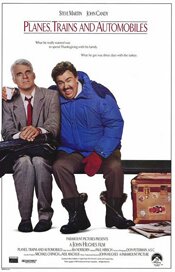 Directed by John Hughes
Directed by John Hughes
Planes, Trains and Automobiles is an absolute gem of a movie. One of the reasons it succeeds so well is because it is so simple and maintains its focus throughout.
Steve Martin (Neal) is heading home to Chicago for Thanksgiving. So is John Candy (Del). They are travellers with personalities at opposite ends: Neal is a prim and proper, an anal businessman, while Del is a talkative, somewhat crass low-rent guy who sells shower curtain rings. Circumstances, increasingly ludicrous yet believable, keep throwing them together. Martin’s character feels nothing but irritation about his situation and with Candy’s character while Candy’s Del is oblivious – he just goes with the flow. Together, they take planes, trains, cars, trucks and so on as they try to get home.
It’s a variation of the buddy, road-movie of film. But I think it shows why these kinds of movies are so popular when they’re well done. It is all about the characters and their relationship. In this case, Steve Martin and John Candy are a perfect pairing. I’ve always liked Martin best when he plays more of a straight character. In this film, he plays straight though this doesn’t mean he’s not comedic. On the contrary, he is more comedic because of this. Everything happens to him and his reactions are priceless.
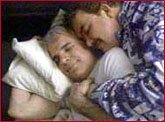 Candy, on the other hand, has never been more lovably obnoxious. He’s the boob, the stooge. Always well-intentioned but almost everything he does causes disaster for Martin’s Neal. It’s very much a Laurel and Hardy or Martin and Lewis kind of combination that they play. A lot of the humour is slapstick – visual – and it works well. While many comedies are amusing, I find I don’t often laugh as I watch them, though I may smile. In this movie, I laughed. And that is the litmus test for comedy.
Candy, on the other hand, has never been more lovably obnoxious. He’s the boob, the stooge. Always well-intentioned but almost everything he does causes disaster for Martin’s Neal. It’s very much a Laurel and Hardy or Martin and Lewis kind of combination that they play. A lot of the humour is slapstick – visual – and it works well. While many comedies are amusing, I find I don’t often laugh as I watch them, though I may smile. In this movie, I laughed. And that is the litmus test for comedy.
The film, however, doesn’t work just because of its comedy. And the comedy doesn’t work in a vacuum. The characters created by writer-director John Hughes’ script, and brought to life by Martin and Candy, are what allow everything to play out successfully. It’s in the developing relationship, and the degree of depth the actors give their characters, that guides the movie forward.
The movie isn’t just about getting laughs; it has a theme which is the value of home and relationships. Thematically, it’s similar to It’s A Wonderful Life. It’s not particularly profound; it’s rather simple. But again, this simplicity is part of what allows the film to work and also part of its appeal. It’s accessible and understandable to pretty much everyone. The key in making a movie such as this is avoiding a saccharine quality. This movie, while it may have a wisp of that, doesn’t succumb and this gives it credibility. The humour, too, takes the edge off any hint of sappiness.
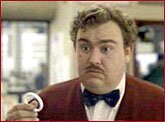 I think, too, there’s something worth an essay or two in the fact that movies like Planes, Trains and Automobiles (and many Capra films like It’s A Wonderful Life) can be and are watched over and over again.
I think, too, there’s something worth an essay or two in the fact that movies like Planes, Trains and Automobiles (and many Capra films like It’s A Wonderful Life) can be and are watched over and over again.
Why is something so simple so compelling? Why do other, more apparently profound films, hard to view more than once without becoming bored, while films like this can be seen again and again? As with children when they want to hear the same story over and over, certain stories, certain themes, address something we need to have repeated for one reason or another. I think it probably has something to do with truth – not the truth of tangible reality, but some truth or truths about us, people, and our relationships with one another.
If you haven’t seen Planes, Trains and Automobiles, or if it has been a while since you’ve seen it, this one is highly recommended. It’s what a comedy should be – funny. In fact the only reservation I have about the movie, the only thing I could find fault with, is the music. It sets the film far too firmly in the 1980’s. If the music were removed, the film is timeless.
But don’t worry – the music isn’t bad. Just anachronistic. And it doesn’t interfere with the enjoyment of the film. (But let me add – I loved the carousel sounding rendition of the Red River Valley song.)
On Amazon:
- Planes, Trains and Automobiles — Video on Demand
- Planes, Trains and Automobiles — DVD, Amazon.com (U.S.)
- Planes Trains and Automobiles — DVD, Amazon.ca (Canada)
The Frank Oz comedies
I’ve always liked the comedies of Frank Oz. In fact, I would say that of the films I watch repeatedly, Frank Oz comedies are among the ones I most watch over and over. In a sense, they are a kind of cinematic comfort food. I always enjoy them and I always feel good after having watched them.
 His comedies are a bit deceptive. They seem too nice (whatever that means). They seem perhaps too slick, or too something, because they have a pleasant Hollywood gloss to them, which gives them a feeling of unreality.
His comedies are a bit deceptive. They seem too nice (whatever that means). They seem perhaps too slick, or too something, because they have a pleasant Hollywood gloss to them, which gives them a feeling of unreality.
But that’s really why they work the way they do. They aren’t realistic and they aren’t intended to be. They’re movies about interesting, and funny, characters in absurd situations.
What I like most about his comedies, however, is that they are funny without being mean-spirited, as many comedies tend to be. It isn’t the humour of a misanthrope but rather the humour of someone who finds life and people to be wonderful, but also wonderfully ridiculous.
Still, there is a certain (if minimal) element of darkness, even anger in them, but it is kept in abeyance. It’s never allowed to overwhelm the films; it simply serves as a root element from which to spring and inform the comedy. (An example would be In & Out, with intolerance at its core, or the satire of The Stepford Wives – not the best Oz film but certainly better than some gave it credit for.)
Ultimately, Frank Oz comedies are delightful confections that seem to laugh at us while loving us, and loving us especially for those things that make Oz laugh.
Comedies directed by Frank Oz (a partial list):
- Dirty Rotten Scoundrels (1988)
- What About Bob? (1991)
- In & Out (1997)
- Bowfinger (1999)
- The Stepford Wives (2004)
- Death at a Funeral (2007)
(Of the above, I think my favourite may be Dirty Rotten Scoundrels, which I’ve watched so many times I’ve lost count. I can’t believe I’ve never written about it.)



